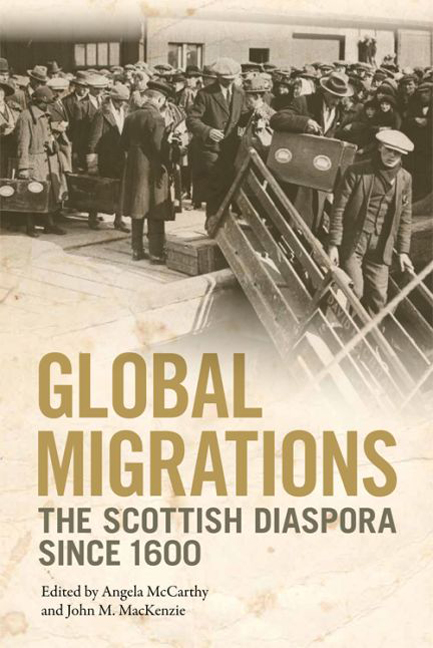Book contents
- Frontmatter
- Contents
- List of Figures and Tables
- Notes on the Contributors
- Acknowledgements
- A Tribute to Sir Tom Devine
- 1 Introduction-Global Migrations: The Scottish Diaspora since 1600
- 2 ‘As Hewers of Wood, and Drawers of Water’: Scotland as an Emigrant Nation, c. 1600 to c. 1800
- 3 ‘You Have Only Seen the Fortunate Few and Draw Your Conclusion Accordingly’: Behavioural Economics and the Paradox of Scottish Emigration
- 4 Scottish Diasporas and Africa
- 5 ‘Have the Scotch no Claim upon the Cherokee?’ Scots, Indians and Scots Indians in the American South
- 6 Conflicts of Interest, Crises of Conscience: Scots and Aboriginal People in Eastern Australia, 1830s–1861
- 7 The Importance of Scottish Origins in the Nineteenth Century: James Taylor and Ceylon Tea
- 8 ‘Our Old World Diff'rences are Dead’: The Scottish Migrant Military Tradition in the British Dominions during the First World War
- 9 ‘Part of my Heritage’: Ladies’ Pipe Bands, Associational Culture and ‘Homeland’ Identities in the Scottish Diaspora
- 10 Understanding Scottishness among Sojourners, Settlers and Descendants in Hong Kong and New Zealand
- 11 Encountering an Imaginary Heritage: Roots Tourism and the Scottish Diaspora
- 12 Home is where the Heart is: Affinity Scots in the Scottish Diaspora
- 13 What Scottish Diaspora?
- 14 Afterword
- Index
4 - Scottish Diasporas and Africa
Published online by Cambridge University Press: 23 September 2017
- Frontmatter
- Contents
- List of Figures and Tables
- Notes on the Contributors
- Acknowledgements
- A Tribute to Sir Tom Devine
- 1 Introduction-Global Migrations: The Scottish Diaspora since 1600
- 2 ‘As Hewers of Wood, and Drawers of Water’: Scotland as an Emigrant Nation, c. 1600 to c. 1800
- 3 ‘You Have Only Seen the Fortunate Few and Draw Your Conclusion Accordingly’: Behavioural Economics and the Paradox of Scottish Emigration
- 4 Scottish Diasporas and Africa
- 5 ‘Have the Scotch no Claim upon the Cherokee?’ Scots, Indians and Scots Indians in the American South
- 6 Conflicts of Interest, Crises of Conscience: Scots and Aboriginal People in Eastern Australia, 1830s–1861
- 7 The Importance of Scottish Origins in the Nineteenth Century: James Taylor and Ceylon Tea
- 8 ‘Our Old World Diff'rences are Dead’: The Scottish Migrant Military Tradition in the British Dominions during the First World War
- 9 ‘Part of my Heritage’: Ladies’ Pipe Bands, Associational Culture and ‘Homeland’ Identities in the Scottish Diaspora
- 10 Understanding Scottishness among Sojourners, Settlers and Descendants in Hong Kong and New Zealand
- 11 Encountering an Imaginary Heritage: Roots Tourism and the Scottish Diaspora
- 12 Home is where the Heart is: Affinity Scots in the Scottish Diaspora
- 13 What Scottish Diaspora?
- 14 Afterword
- Index
Summary
THE PLURAL IS IMPORTANT. There have been several Scottish diasporas to Africa, not just in the sense of different periods and regions, or in terms of the movement of people as sojourners and settlers, but also in respect of religious and cultural influences, and then again in the realm of perceptions, of both intellectual and popular ideas. It might be thought that there would be a curious asymmetry in charting the connections between one small and poor society in north-western Europe and an entire continent with a host of different peoples and contrasting environmental regions. Yet the nature of the imperial period was such that a study of the inter-penetration of Scotland and Africa is essential, not least in terms of the reciprocal influences stimulated by the relationship. This reciprocity has to be understood, for the influence of Africa on Scotland and Scottish self-perceptions is itself important. Imperial influences were never one-way and cannot be examined solely through the dissemination of people, faiths and ideas. Empire was always about exchanges, negotiations, interactions, and the relationship of Scotland and Africa well reflects this. Moreover, the reciprocities occurred within Africa itself, for there were some intriguing ways in which African societies seem to have adopted Scottish forms into elements of, for example, their dance traditions. All of this indicates the manner in which Scottish ethnicity was undoubtedly seen as being distinct from that of the English. Moreover, the Scottish influence upon Africa certainly took different forms from that of other Britons.
The movement of Scots to Africa was different in kind from migrations to Canada, Australia and New Zealand. Although those three territories of settlement all had indigenous societies, whites overwhelmed them in terms of sheer numbers, backed by unstoppable military and political power. In British-controlled Africa, land alienation and indigenous dispossession took place in the territories that became the Union of South Africa, in Southern and Northern Rhodesia (Zimbabwe and Zambia), as well as in Nyasaland (Malawi) and Kenya. Most migrants to Africa were either professionals or people with capital, although many migrants to South Africa were working class. All migrants experienced an immediate boost to social status since whites were seldom involved in manual labour. They suddenly found themselves in supervisory roles, controlling low-paid African workers, as well as living with servants.
- Type
- Chapter
- Information
- Global MigrationsThe Scottish Diaspora since 1600, pp. 63 - 80Publisher: Edinburgh University PressPrint publication year: 2016

